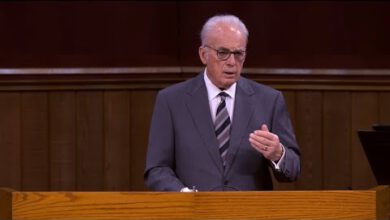John MacArthur: How Should We Pray?
John MacArthur: How Should We Pray?
Luke 11:1 (ESV) – The Lord’s Prayer and the Jewish Tradition of Prayer
In Luke 11:1, it is written: “Now Jesus was praying in a certain place, and when He finished, one of His disciples said to Him, ‘Lord, teach us to pray, as John taught his disciples.’ And He said to them, ‘When you pray, say: “Father, hallowed be Your name. Your kingdom come. Give us each day our daily bread. And forgive us our sins, for we also forgive everyone who is indebted to us. And lead us not into temptation.”‘
Understanding the Context:
During Jesus’ time, the concept of personal access to God was somewhat misunderstood and complicated among the Jewish people. The rabbis had taught that God was distant and transcendent, making it impossible for people to experience an intimate relationship with Him. They believed that God was too unapproachable, and only the high priest could enter His presence once a year on the Day of Atonement, after proper preparations. This view was rooted in the fear of God’s holiness, a result of their experience with the dramatic and terrifying manifestation of His presence on Mount Sinai, where thunder, lightning, and smoke filled the air.
However, this concept had been stretched beyond its biblical foundation. In the Old Testament, God was indeed portrayed as accessible and willing to hear the prayers of His people. Numerous passages highlight God’s nearness to those who call upon Him, like in Psalm 50:15, “Call upon Me in the day of trouble; I will deliver you, and you shall glorify Me,” or Psalm 91:15, “When he calls to Me, I will answer him.” This suggests that God is, in fact, approachable to all who seek Him, not just through the high priest.
Jewish Traditions on Prayer:
Jewish rabbis taught that God eagerly listens to the prayers of the righteous, and some even emphasized the importance of prayer over sacrifice. The rabbis encouraged prayer as a continuous act, not merely for times of need, but also during times of prosperity. A key teaching from the Talmud instructs: “Honor the physician before you have need of him,” highlighting the importance of maintaining a prayerful life at all times.
When analyzing Old Testament prayers, certain themes are evident. Jewish prayers often include praise, gratitude, and thanksgiving, with prayers designed to honor God’s holiness. Psalm 34:2 says, “I will bless the Lord at all times; His praise shall continually be in my mouth.” Similarly, Psalm 51:17 emphasizes the role of thanksgiving, with David’s prayer being a prime example of a prayer filled with gratitude.
The Components of Jewish Prayer:
- Praise and Worship: Jewish prayers often start with expressions of love and praise for God’s greatness and holiness.
- Gratitude and Thanksgiving: Thanksgiving is a consistent theme in Jewish prayer, with gratitude for God’s blessings and mercy being central.
- Affirmation of God’s Holiness: Recognizing God’s glory and presence, as if the Shekinah—the divine presence—was directly before them.
- Desire to Obey God: Prayers express a longing to follow God’s commandments, reflecting a heart willing to obey His Word. Psalm 119:103, “How sweet are Your words to my taste, sweeter than honey to my mouth!” exemplifies this.
- Confession of Sin and Purity of Heart: Jewish prayers include confessions, asking for forgiveness and the purification of the heart, as seen in Psalm 26:6, “I will wash my hands in innocence and go about Your altar, O Lord.”
In this rich tradition, the Lord’s Prayer serves as a profound, concise model for prayer, drawing on these elements while offering a direct, intimate communication with God the Father.
